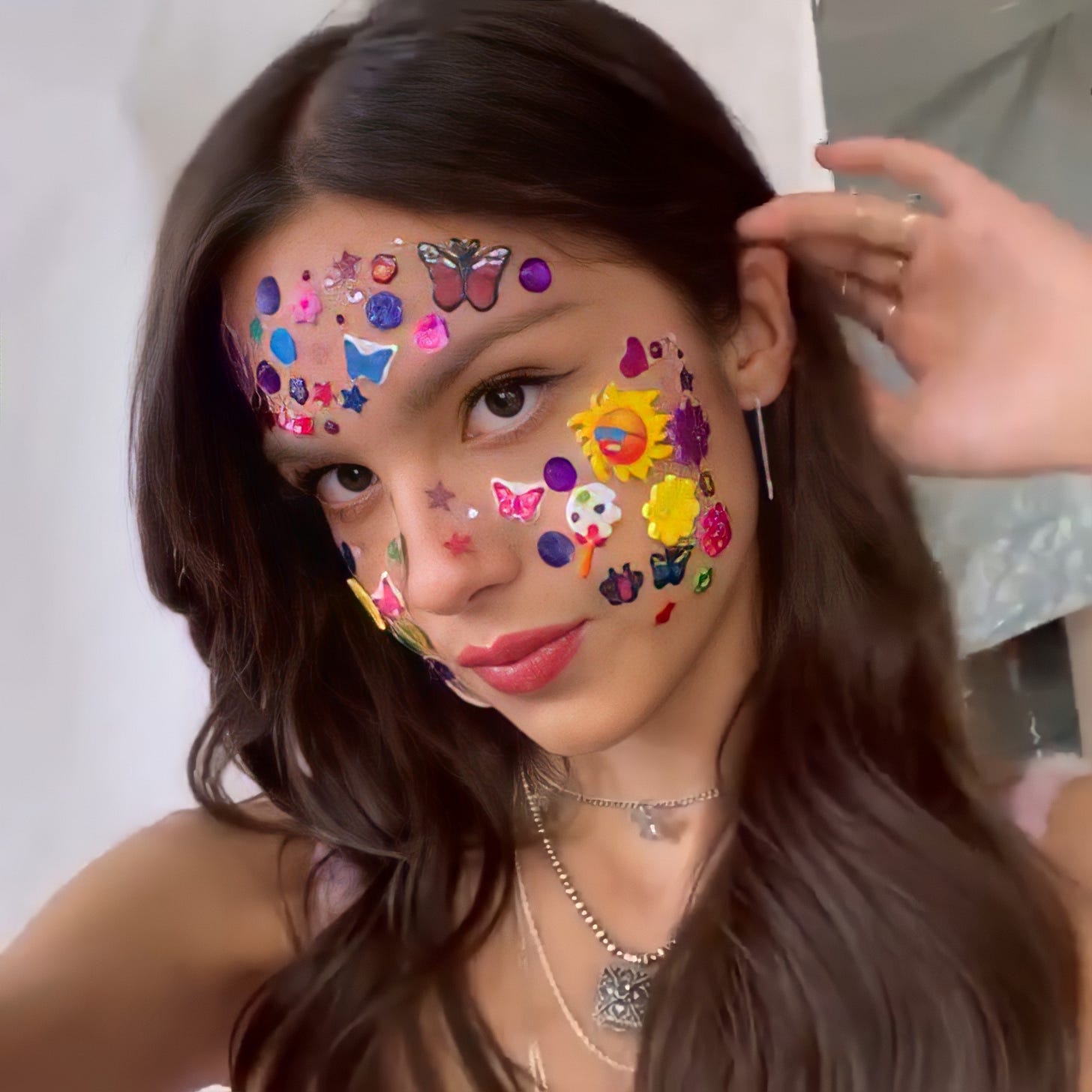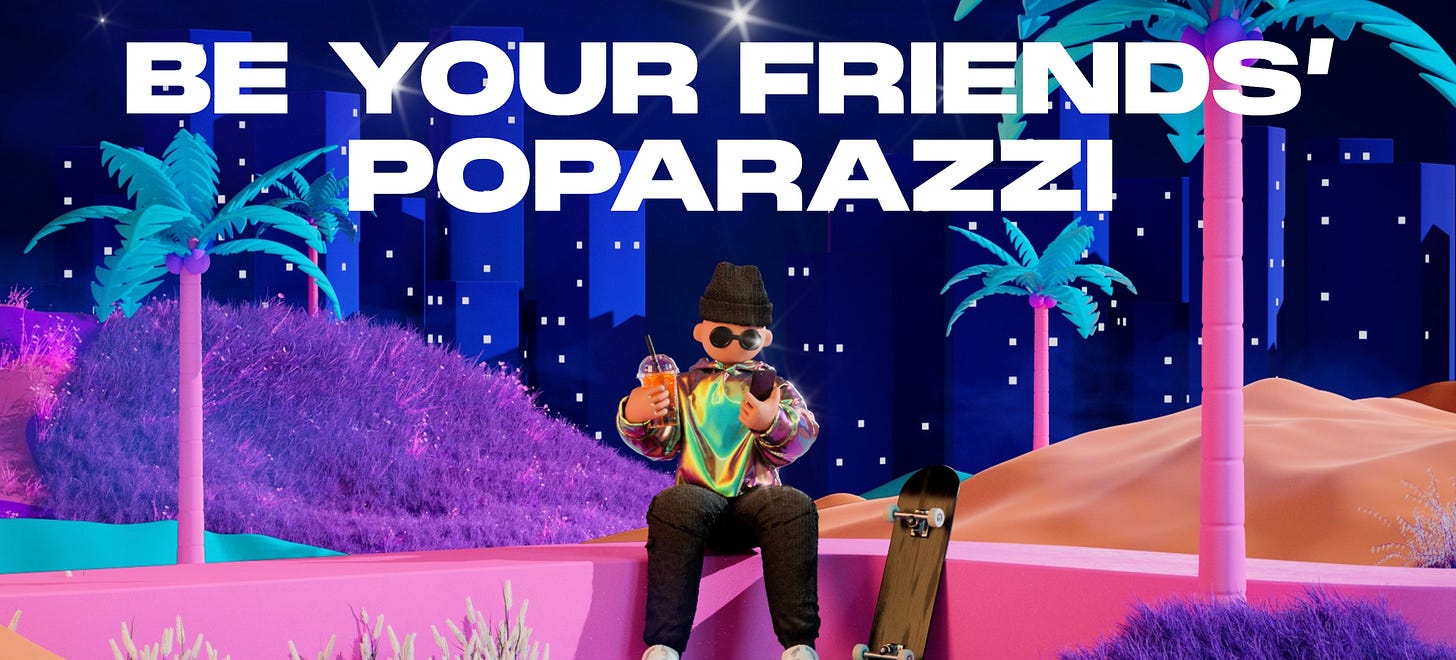The Startups Reinventing Social Media
Exploring the Rise of BeReal, Poparazzi, and Dispo
This is a weekly newsletter about how people and technology intersect. To receive this newsletter in your inbox each week, subscribe here:
The Startups Reinventing Social Media
Last week belonged to Olivia Rodrigo. The 18-year-old singer released her debut album, SOUR, which immediately became the biggest album of the year. Her single “Good 4 U” became her second #1 hit of 2021 after her January smash “Drivers License” (which spent eight weeks at #1, the most ever for a debut single). With “Good 4 U”, Rodrigo broke Spotify’s record for the biggest streaming week ever. The record she broke? Her own, for “Drivers License”. And Rodrigo’s pitch-perfect performance on SNL led Variety to declare, “The next superstar is born.”
Thank you for indulging me: this piece isn’t about Olivia Rodrigo, though I could talk about her all day (the hype is totally warranted). This piece is about the new crop of social apps being built with Gen Z ethos. But there’s a reason I started the piece with Olivia Rodrigo: I found myself reflecting on the evolution of social media while listening to Rodrigo’s song “jealousy, jealousy”. The opening lyrics:
I kind of want to throw my phone across the room
Cause all I see are girls too good to be true
With paper-white teeth and perfect bodies
Wish I didn’t care
Rodrigo goes on to sing in the chorus, “Comparison is killing me slowly, I think I think too much about kids who don’t know me.” This is a song that could only be written by someone who grew up with social media—someone who has never known a world free from the pressure to airbrush your life online.
Rodrigo’s lyrics capture the last generation of social media: performative, curated, inauthentic. But we’re seeing the rise of a new generation of social apps—apps that emphasize spontaneity and authenticity.
I’m going to look at three new social companies—BeReal, Poparazzi, and Dispo—and then explore more broadly how social media is evolving.
BeReal
BeReal is a Paris-based startup that’s taken France by storm over the past few months. As the name suggests, the app is all about being real: every day at a random time, you’re given two minutes to capture a photo of what you’re doing. Here’s my notification to capture a “BeReal” yesterday, which came at 7:54am:
BeReal’s camera snaps a photo from the front camera and the back camera, capturing a three-dimensional snapshot of what you’re up to. The app’s unpredictable timing and strict two-minute limit force serendipity. The idea is to see your friends in all their impromptu, unfiltered glory. And you can only see your friends’ photos if you post one of your own.
BeReal creates a surprising intimacy: using the app, you feel closer to people you haven’t spoken to in months or years by glimpsing their everyday lives. The moments captured are often mundane—working at your desk, making dinner, grocery shopping—and that mundaneness is refreshing.
In France, BeReal sits in the top 5 social apps, wedged between Messenger and Discord.
Poparazzi
Poparazzi launched last Monday and debuted at #1 on the App Store. The app’s premise is simple: you take photos of your friends, and they take photos of you. Your profile shows both pictures you’ve “popped” of friends and pictures your friends have popped of you.
Poparazzi’s camera can’t be flipped to front-facing, meaning you can’t take a selfie. The goal is to create a more organic, authentic photo-sharing app. In the words of its developers, Poparazzi hopes to “make social media less self-centered, and more about the people we care about.”
Poparazzi also rethinks several other social media features. You can’t edit photos before posting them. You can’t comment on photos or “like” photos, but you can react with emojis. And you can’t see anyone’s follower count, only how many views someone’s “pops” have.
Poparazzi ranked #1 on the App Store for most of its first week; today, it sits at #16. The app has some built-in viral features that should help fuel its growth. When you take a photo of a friend who isn’t on the app, you “tag” that person’s contact and the person receives a text telling them a photo has been posted of them.
Dispo
Dispo’s tagline is “Live in the Moment”. The app replicates the concept of a disposable camera. You open the app and take photos, then wait for the photos to “develop” at 9am the next day.
This forced delay hopes to encourage more authentic moments. Dispo also won’t let you edit photos or upload your own photos. The app does offer “rolls”—collections of photos that users can curate together or with friends.
Dispo was co-founded by David Dobrik, one of the most popular Gen Z creators with 26 million TikTok followers and 18 million YouTube subscribers. (The first iteration of the app was called David’s Diposable.) But tying a company to one personality is risky. When David Dobrik’s vlog squad came under fire for claims of sexual assault this spring, Dispo was collateral damage. Early investors pulled their funding and Dispo quickly separated itself from Dobrik.
Dispo is working to recover from the Dobrik association and rekindle its buzz. Today, Dispo sits at #94 in “Photo & Video” on the App Store.
The New Ethos of Social Media
Instagram co-founder Kevin Systrom was on vacation with his wife in Mexico when she told him, “I don’t think I’m ever going to use this app…My photos aren’t good…They aren’t as good as your friend Greg’s.” Kevin told her, “Well, Greg filters all his photos.” She looked at him and said, “You should add filters then.” So Systrom, using the dial-up internet at the Mexico bed and breakfast, built the first Instagram filter, X-Pro 2, and posted the first-ever Instagram photo:

Instagram got its start as a literal filtered version of reality. It was a highlight reel—a place to showcase your life with a glossy sheen. And as one of the first mobile-native social apps, Instagram was always with us; social media became 24/7. The app catalyzed the “Experience Economy”—80% of Millennials said they’d rather spend money on experiences than on things. Symbols of status shifted: a Coach bag became an Instagram photo from Coachella.
Instagram’s ethos defined the 2010s of social media: performative, curated, manicured. Apps like Facetune rode the wave, making it easy to airbrush your photos. This image is an actual image used in a Facetune advertisement:
The past few years have brought a growing backlash to inauthenticity on social media and a growing awareness of social media’s impact on mental health. Instagram has become slightly less filtered and contrived. Younger users, for instance, popularized the “photo dump”—a carousel of unrelated and unedited posts straight from the camera roll.
Compare my posts from 2017 vs. 2020. The top row of photos is from the past year—these are all photo dumps. The bottom row of photos is from 2017. Somehow, I managed to hit on all the cringeworthy stereotypes of mid-2010s Instagram: colorful walls, latte art, avocado toast, murals, “candid” tourist pics 🤦🏼♂️ Yikes.
But as Instagram’s ethos have shifted, the app has lost its core attribute: simplicity.
In the beginning, Instagram’s founders were disciplined. All photos were square. There were no hyperlinks. There was no “repost” feature to make posts go viral, like Twitter’s “retweet”. Instagram was minimalist.
After being acquired by Facebook, Instagram continued to keep things simple. In her book No Filter, Sarah Frier writes that Instagram came up with values to insulate itself from Facebook:
[One value] was “simplicity matters,” meaning that before any new products could roll out, engineers had to think about whether they were solving a specific user problem, and whether making a change was even necessary, or might overcomplicate the app.
Contrast Instagram with Facebook around that time:
But over time, Instagram has tried to become everything to everyone. It’s become crowded with features—grid posts, Stories, IGTV, Instagram Shop, Reels, DMs.
BeReal, Poparazzi, and Dispo are all refreshing in their simplicity—just as Instagram was in its early days. They are also born natively from today’s ethos of authenticity and spontaneity; they don’t have Instagram’s scar tissue of performative social media.
The ethos of these new apps is more akin to Snapchat and TikTok, the other two of the “big three” social apps for today’s youth.
TikTok is on a tear. It took TikTok 2.5 years to reach 1 billion downloads (for reference, it took Instagram 7 years), and only 8 months to get the next billion. The app is much more “Gen Z” in its spirit. Case in point: while Instagram began with filters to beautify your life, TikTok’s most-popular filters actually make you look worse.
Snap is likewise firing on all cylinders. More 13- to 34-year-olds in the U.S. are on Snapchat than are on Instagram or TikTok. Evan Spiegel’s strategy is to 1) keep younger users as they age, and 2) attract new cohorts of young users. It seems to be working.
But Snapchat is really a messaging app. TikTok is a content platform—more a mobile-first YouTube than a social network. Of the “big three”, Instagram is most vulnerable. Monthly active users are stagnant at ~1.2 billion and time spent on the app is declining. Instagram was built with the wrong ethos—which linger in public perception of the app—and has become clunky and over-complicated over time. That leaves an opening for a new photo-sharing social network.
This is the opportunity that BeReal, Poparazzi, and Dispo are all going after. It’s a massive opportunity: Instagram brought in $20 billion in revenue in 2019, good for ~30% of Facebook’s revenue and ~70% of Facebook’s revenue growth.
Final Thoughts
Culture moves fast. In The Rejection of Internet Perfection, I called this the shift from Kylie Jenner to Charli D’Amelio. If Kylie embodies Instagram, Charli embodies TikTok. If Kylie was about aspiration, Charli is about relatability.
Olivia Rodrigo embodies this shift in culture more broadly—Rodrigo is a young superstar steeped in authenticity. She captures the pendulum swing that’s happening in social media. Like other Gen Zs, she understands social media’s shortcomings because she grew up experiencing them.
Here’s the caption for an Instagram post Rodrigo made last April:
today I took the classic Instagram dive, comparing myself to girls incessantly and wishing I had what they looked like they had. it’s so silly how we/i define ourselves by the most arbitrary things and idolize ppl who are humans just like us. anyway, i wrote this song today about the tendency I have to go down this self sabotaging hole and now I’m posting it on Instagram because I love irony. if ur reading this pls know that ur value is so inherent. it’s not something that could ever be defined by something as contrived and manipulative as social media. you are so loved!
If BeReal, Poparazzi, and Dispo succeed, social media won’t be as “contrived and manipulative” as it’s been. Sharing our lives in photos and videos will be more in-the-moment and organic and real, with the new era of social media diffusing the pressure cooker created in the last era.
Thanks for reading! Subscribe here to receive this newsletter in your inbox each week:
















